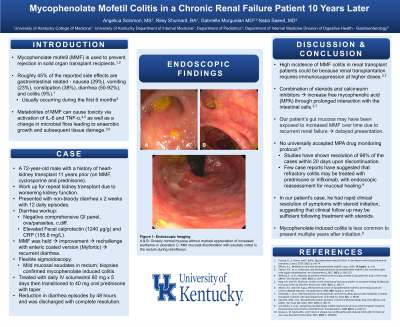Sunday Poster Session
Category: Colon
P0233 - Mycophenolate Mofetil Colitis in a Chronic Renal Failure Patient 10 Years Later
Sunday, October 22, 2023
3:30 PM - 7:00 PM PT
Location: Exhibit Hall

Has Audio

Riley Shumard
University of Kentucky
Lexington, KY
Presenting Author(s)
Angelica L. Solomon, MS, Riley Shumard, , Gabrielle Morguelan, MD, Naba Saeed, MBBS
University of Kentucky, Lexington, KY
Introduction: Mycophenolate mofetil (MMF) is used to prevent rejection in solid organ transplant recipients. Roughly 45% of the reported side effects are gastrointestinal related - nausea (29%), vomiting (23%), constipation (38%), diarrhea (50-92%), and colitis (9%) - usually occurring during the first 6 months. Metabolites of MMF can cause toxicity via activation of IL-6 and TNF-ɑ, as well as a change in microbial flora leading to anaerobic growth and subsequent tissue damage.
Case Description/Methods: A 72-year-old male with a history of Heart-kidney transplant 11 years prior (on MMF, cyclosporine and prednisone), being worked up for repeat kidney transplant due to worsening kidney function, presented with non-bloody diarrhea x 2 weeks with 12 daily episodes.
Diarrhea workup: negative comprehensive GI panel, ova / parasites, C.diff. Elevated Fecal calprotectin (1240 µg/g) and CRP (155.8 mg/L). MMF was initially held, with improvement, but rechallenege with enteric coated version (Myfortic) caused recurrent diarrhea
Flexible sigmoidoscopy: mild mucosal exudates in rectum; biopsies confirmed mycophenolate induced colitis. He was treated with daily IV solumedrol 60 mg x 5 days then transitioned to 40 mg oral prednisone and tapered down. He had a reduction in diarrhea episodes by 48 hours and was discharged with complete resolution of diarrhea.
Discussion: This case highlights the successful treatment of MMF induced colitis with steroids. The high incidence of MMF colitis in renal transplant patients could be because renal transplantation requires immunosuppression at higher doses. The combination of steroids and calcineurin inhibitors may also increase free mycophenolic acid (MPA) through prolonged interaction with the intestinal cells. Our patient’s gut mucosa may have been exposed to more mycophenolate over time from his recurrent renal failure, contributing to his delayed presentation.
There is no universally accepted MPA drug monitoring protocol. Studies have shown resolution of 98% of the cases within 20 days upon discontinuation. Few case reports have suggested that refractory colitis may be treated with prednisone or Infliximab, with endoscopic reassessment for mucosal healing. In our patients case, he had rapid clinical resolution of symptoms with steroid initiation, suggesting that clinical follow up may be sufficient following treatment with steroids. Further studies are necessary to determine a standard treatment guideline for these patients.

Disclosures:
Angelica L. Solomon, MS, Riley Shumard, , Gabrielle Morguelan, MD, Naba Saeed, MBBS. P0233 - Mycophenolate Mofetil Colitis in a Chronic Renal Failure Patient 10 Years Later, ACG 2023 Annual Scientific Meeting Abstracts. Vancouver, BC, Canada: American College of Gastroenterology.
University of Kentucky, Lexington, KY
Introduction: Mycophenolate mofetil (MMF) is used to prevent rejection in solid organ transplant recipients. Roughly 45% of the reported side effects are gastrointestinal related - nausea (29%), vomiting (23%), constipation (38%), diarrhea (50-92%), and colitis (9%) - usually occurring during the first 6 months. Metabolites of MMF can cause toxicity via activation of IL-6 and TNF-ɑ, as well as a change in microbial flora leading to anaerobic growth and subsequent tissue damage.
Case Description/Methods: A 72-year-old male with a history of Heart-kidney transplant 11 years prior (on MMF, cyclosporine and prednisone), being worked up for repeat kidney transplant due to worsening kidney function, presented with non-bloody diarrhea x 2 weeks with 12 daily episodes.
Diarrhea workup: negative comprehensive GI panel, ova / parasites, C.diff. Elevated Fecal calprotectin (1240 µg/g) and CRP (155.8 mg/L). MMF was initially held, with improvement, but rechallenege with enteric coated version (Myfortic) caused recurrent diarrhea
Flexible sigmoidoscopy: mild mucosal exudates in rectum; biopsies confirmed mycophenolate induced colitis. He was treated with daily IV solumedrol 60 mg x 5 days then transitioned to 40 mg oral prednisone and tapered down. He had a reduction in diarrhea episodes by 48 hours and was discharged with complete resolution of diarrhea.
Discussion: This case highlights the successful treatment of MMF induced colitis with steroids. The high incidence of MMF colitis in renal transplant patients could be because renal transplantation requires immunosuppression at higher doses. The combination of steroids and calcineurin inhibitors may also increase free mycophenolic acid (MPA) through prolonged interaction with the intestinal cells. Our patient’s gut mucosa may have been exposed to more mycophenolate over time from his recurrent renal failure, contributing to his delayed presentation.
There is no universally accepted MPA drug monitoring protocol. Studies have shown resolution of 98% of the cases within 20 days upon discontinuation. Few case reports have suggested that refractory colitis may be treated with prednisone or Infliximab, with endoscopic reassessment for mucosal healing. In our patients case, he had rapid clinical resolution of symptoms with steroid initiation, suggesting that clinical follow up may be sufficient following treatment with steroids. Further studies are necessary to determine a standard treatment guideline for these patients.

Figure: Mild mucosal discoloration with exudates in the rectum noted during retroflexion.
Disclosures:
Angelica Solomon indicated no relevant financial relationships.
Riley Shumard indicated no relevant financial relationships.
Gabrielle Morguelan indicated no relevant financial relationships.
Naba Saeed indicated no relevant financial relationships.
Angelica L. Solomon, MS, Riley Shumard, , Gabrielle Morguelan, MD, Naba Saeed, MBBS. P0233 - Mycophenolate Mofetil Colitis in a Chronic Renal Failure Patient 10 Years Later, ACG 2023 Annual Scientific Meeting Abstracts. Vancouver, BC, Canada: American College of Gastroenterology.
